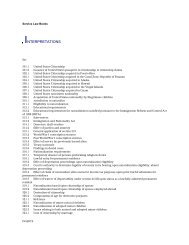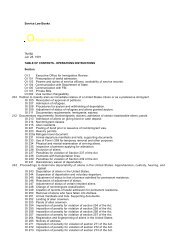Create successful ePaper yourself
Turn your PDF publications into a flip-book with our unique Google optimized e-Paper software.
<strong>Inspector's</strong> <strong>Field</strong> <strong>Manual</strong><br />
a citizen?", includes an accent that indicates that the person is not a native speaker of English, the person should<br />
be asked how he or she became an American citizen. If the applicant claims recent naturalization, that may be<br />
sufficient to convince you he or she is a U.S. citizen or it may prompt further questions, or a check of the Central<br />
Index.<br />
Become familiar with the persons at your port who can assist you in the questioning of a suspected false claim.<br />
A native Spanish speaker, familiar with various local accents and idioms, is more likely to quickly detect, for<br />
example, a Central American claiming birth in Puerto Rico. Learn the procedures used by various local officials<br />
involved in issuing citizenship documents; request original or certified copies of documents which are presented.<br />
A word of caution -- Never refer a person to secondary as a false claim simply because the person is belligerent,<br />
disrespectful or suspected of being under the influence of alcohol or other drugs. Refer him or her when you have<br />
some reason to believe the person is an alien attempting to commit a fraud.<br />
A new ground of inadmissibility for false claims to U.S. citizenship was added to §212(a)(6)(C)(ii) of the Act by<br />
IIRIRA, for representations made on or after the date of enactment, September 30, 1996. Aliens who make a false<br />
claim to U.S. citizenship therefore are subject to the expedited removal provisions of §235(b)(1) of the Act. See<br />
Chapter 17.15 for expedited removal procedures.<br />
(b) Procedures. Once you have made a determination that an applicant for admission is making an false claim<br />
U.S. citizenship, process the case as an expedited removal case or permit withdrawal of application for<br />
admission. In order to prevent the improper removal of a U.S. citizen without hearing or review, a provision<br />
was added to the regulations in 8 CFR 235.3(b)(5) to provide for a review of the expedited removal order by an<br />
immigration judge. As with any claim to U.S. citizenship, every effort should be made to either verify or<br />
disprove the claim prior to proceeding with issuance of a removal order. Only those cases where you are<br />
absolutely not satisfied that the person is a U.S. citizen should result in a removal order. To refer the case to a<br />
judge, use Form I-863, executing block 4 of the form. In cases of claims supported by documentation, in addition<br />
to the above, complete Form G-329, Documented False Claim to Citizenship, and forward it to:<br />
EPIC<br />
2211 East Missouri St.<br />
El Paso, TX 79903<br />
Attach the original documents, unless they are being used as evidence, a complete set of the alien's fingerprints on<br />
Form FD-249, and a photograph. If original documents are needed for other purposes, attach a photocopy. If a<br />
genuine document is being presented by an imposter, obtain, if possible, biographic and family information<br />
relating to the person to whom the document relates. [Detailed instructions on preparing Form G-329 are<br />
contained in Chapter 32.6.]<br />
17.5 Waivers.<br />
(a) General. The grounds of inadmissibility applicable to aliens are established by §212 of the Act. There are a<br />
series of exemptions and waivers for various grounds of inadmissibility. Exemptions refer to statutory or<br />
regulatory constructions whereby certain classes of aliens are not subject to inadmissibility, under specific<br />
circumstances, based on certain general provisions relating to inadmissibility. No application or adjudication<br />
is needed when an alien is exempt from a ground of inadmissibility. For example, many aliens are, by<br />
regulation, exempt the general passport and visa requirements. Generally, waivers refer to specific applications,<br />
filed individually, and adjudicated to remove temporarily or permanently one or more specific grounds of<br />
inadmissibility. Waivers are available to immigrants pursuant to sections 211(b), 212(a)(3)(D)(iv),<br />
212(a)(9)(B)(v), 212(d)(11), 212(d)(12), 212(e), (g)(1), (g)(2), (g)(3), (h), (i), and (k). Waivers are available to<br />
nonimmigrants under sections 212(d)(1), (d)(3), (d)(4), and (l). Additionally, certain qualifying aliens are<br />
eligible for automatic waivers under sections 212(m) and (o). No application or fee is required for such<br />
automatic waivers. There are a variety of situations involving inspection of aliens requiring waivers of<br />
inadmissibility. In many instances the need for a waiver has been determined and adjudication of a waiver has<br />
been completed before the alien arrives at the port-of-entry. In such cases, the nonimmigrant visa will be noted<br />
or the alien will possess a notice of action approving the waiver. In other instances, the need for a waiver will be<br />
determined during the inspection process and the matter can often be resolved during secondary inspection.<br />
(b) Permanent residents without valid alien registration documents. During the inspection process, you may be




